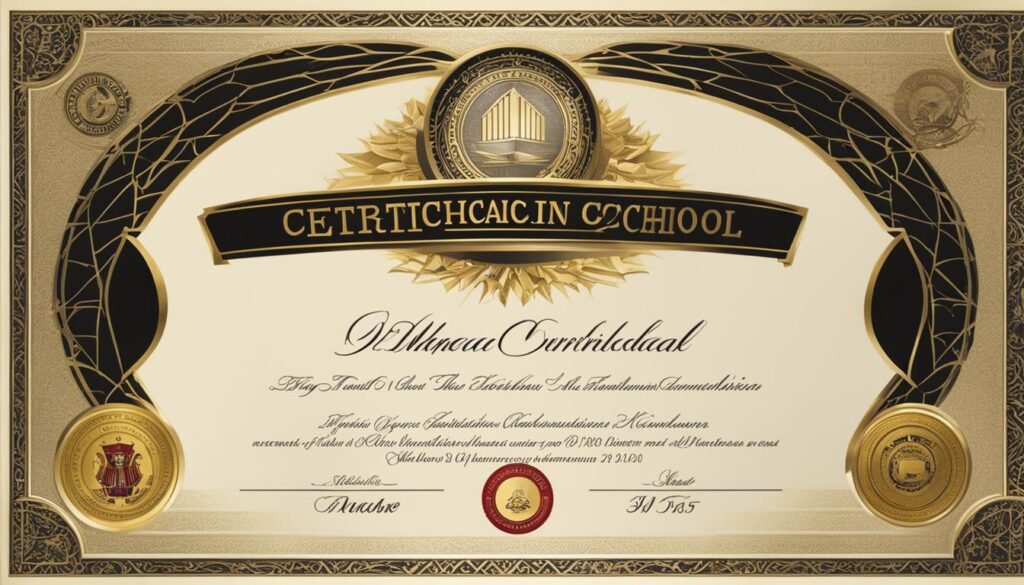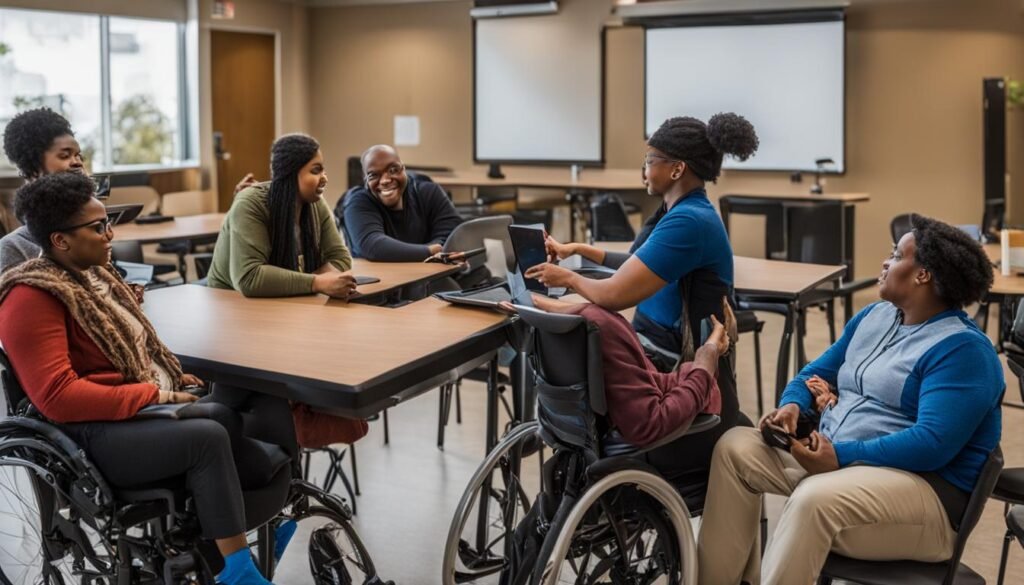Post-secondary education refers to any further education pursued after high school graduation or completion of a GED. It encompasses a variety of options, including colleges, universities, vocational schools, continuing education programs, and life skills programs. The goal of post-secondary education is to prepare individuals for their desired careers or to provide opportunities for personal and professional growth.
Key Takeaways: What Is Post Secondary Education
- Post-secondary education goes beyond high school and GED completion.
- It includes colleges, universities, vocational schools, and continuing education programs.
- The aim is to prepare individuals for careers and personal growth.
- Choosing the right post-secondary institution is crucial for success.
- Post-secondary education opens doors to new opportunities.
The Meaning of Post-Secondary Education
Post-secondary education is a broad term that encompasses various educational options available to individuals after high school or GED completion. It goes beyond traditional college pursuits and provides opportunities for tertiary education and skill development in different fields.
Options for post-secondary education are diverse and cater to a range of interests and career goals. These options include vocational schools, technical schools, and continuing education programs.
Vocational schools and technical schools offer specialized training and certifications in trade-specific fields. These institutions equip students with practical skills that directly prepare them for specific jobs or careers. Examples of vocational schools include culinary institutes, beauty academies, and automotive technician schools. Technical schools, on the other hand, focus on technology-related fields such as computer programming, IT, or engineering technology.
Continuing education programs provide further learning opportunities for individuals seeking professional development, career advancement, or personal growth. These programs offer a wide range of courses and workshops to enhance specific skills and knowledge. They can be pursued alongside other commitments, making them accessible to individuals who wish to balance work, family, and education.
The Benefits of Post-Secondary Education
Post-secondary education offers individuals the chance to pursue tertiary education, gain specialized skills, and broaden their horizons. It opens doors to diverse career paths and equips individuals with the tools needed for success.
The different kinds of post-secondary education cater to varied learning styles and career aspirations. By providing specialized knowledge and practical skills, post-secondary education prepares individuals to navigate the complexities of the modern workforce.
Education after high school or GED completion offers numerous benefits, including:
- Expanded career options: Post-secondary education widens the range of available careers and increases job prospects. It provides individuals with the knowledge and skills needed to excel in their chosen fields.
- Personal growth: Pursuing post-secondary education fosters personal growth and intellectual development. It encourages critical thinking, creativity, and self-discovery.
- Networking opportunities: Post-secondary institutions often provide a platform for students to connect with peers, faculty, and professionals in their field of interest. This networking can lead to valuable connections and future career opportunities.
- Adaptability in a changing job market: With rapid advancements in technology and evolving industries, post-secondary education equips individuals with the ability to adapt and stay relevant in the job market.
Overall, post-secondary education plays a significant role in shaping individuals’ future success and personal fulfillment.
| Educational Option | Description |
|---|---|
| Vocational Schools | Specialized training in trade-specific fields such as culinary arts, beauty, automotive, etc. |
| Technical Schools | Focus on technology-related fields such as computer programming, IT, or engineering. |
| Continuing Education Programs | Offer a wide range of courses and workshops for professional development and personal growth. |
Types of Post-Secondary Education

When it comes to post-secondary education, there is a wide range of options available for individuals looking to further their knowledge and skills. One popular choice is enrolling in a four-year college or university, providing undergraduate and graduate programs for millions of college students. These institutions offer a comprehensive education that includes both general education courses and specialized coursework in a chosen field. Many students choose to pursue their post-secondary education in these institutions to enhance their career prospects and expand their academic horizons.
At a four-year college or university, students have the opportunity to immerse themselves in a vibrant academic environment, surrounded by like-minded individuals and renowned faculty members. They can explore various areas of study, earn an undergraduate degree, and even continue their education through graduate programs. These post-secondary education institutions foster intellectual growth, critical thinking skills, and personal development, preparing students for the challenges of the professional world.
Enrolling in a four-year college or university offers numerous benefits to college students. They gain access to a wide range of resources and support systems, including libraries, research facilities, extracurricular activities, and career services. The undergraduate programs provide a well-rounded education that combines theoretical knowledge with practical skills, equipping students with the necessary tools and credentials for their desired career paths.
Benefits of Four-Year Colleges and Universities
Here are some key benefits of enrolling in a four-year college or university:
- Extensive range of undergraduate programs to choose from
- Opportunities for academic and personal growth
- Access to renowned faculty and experts in various fields
- Networking opportunities with fellow students and professionals
- Internship and co-op programs for gaining practical experience
- Development of critical thinking and problem-solving skills
- Opportunities for research and involvement in cutting-edge projects
- Potential for higher earning potential and career advancement
It is important for college students to carefully consider their interests, goals, and future career paths when choosing a post-secondary education institution. Conducting thorough research and exploring various options will help them make an informed decision that aligns with their aspirations and sets them on a path to success.
Next, we will delve into the specific offerings of vocational schools and technical schools, which provide alternative avenues for post-secondary education and career preparation.
Vocational Schools and Technical Schools

In today’s competitive workforce, obtaining the right skills and qualifications is essential for career success. Vocational schools and technical schools offer specialized training programs designed to equip individuals with the practical skills and knowledge needed for specific trades and professions. These programs provide a valuable opportunity for individuals to pursue their passions, develop their expertise, and excel in their chosen fields.
At vocational schools and technical schools, students can pursue a variety of trades and professions that cater to their interests and career goals. From food and beverage management to hairstyling, plumbing to carpentry, and nursing to automotive technology, there are numerous options available. These programs focus on hands-on training and real-world experiences to ensure that students are well-prepared to enter the workforce upon completion.
One of the key benefits of vocational schools and technical schools is the opportunity to earn a certificate upon completion. This certificate serves as a validation of the skills and knowledge obtained throughout the program, providing individuals with a competitive edge in the job market. Employers often value these certificates as they demonstrate a candidate’s commitment to their chosen profession and readiness to contribute to the workforce.
Furthermore, vocational schools and technical schools play a crucial role in meeting the demands of various industries and trades. With ongoing advancements in technology and evolving workforce needs, these programs ensure that there is a skilled workforce available to fill specific job roles. As industries continue to grow and diversify, the need for individuals with specialized skills and qualifications remains high.
The Benefits of Vocational and Technical Schools:
- Opportunity to pursue specific trades and professions
- Hands-on training and practical skills development
- Earn a certificate upon completion
- Enhanced employability in the workforce
- Meeting industry demands for skilled workers
- Preparation for a successful and fulfilling career
Vocational schools and technical schools offer individuals a comprehensive education tailored to their desired field, enabling them to pursue rewarding careers. These programs provide the necessary foundation and hands-on experience required to excel in the workforce.
“The future belongs to those who believe in the beauty of their dreams.” – Eleanor Roosevelt
By attending vocational schools and technical schools, individuals can translate their dreams into reality. These programs offer a supportive learning environment where students can gain the skills, knowledge, and confidence needed to pursue their career aspirations.
Whether you are interested in joining the workforce quickly or seeking a fulfilling career in a specific trade, vocational schools and technical schools can provide the pathway to success. With their focused curriculum, practical training, and industry-specific expertise, these institutions offer the necessary tools for individuals to thrive in their chosen field.
| Advantages of Vocational and Technical Schools |
Benefits |
|---|---|
| Practical Skills Development | Gain hands-on experience and learn industry-specific skills |
| Job Market Competitiveness | Enhance employability with a recognized certificate |
| Focused Education | Specialize in a specific trade or profession |
| Industry Relevance | Meet the demands of evolving industries and trades |
| Entry Into the Workforce | Prepare for a successful career immediately after completion |
Continuing Education Programs

Continuing education programs offer a wide range of opportunities for individuals seeking to enhance their knowledge and skills in a specific area. Whether you’re looking to advance in your current career, explore new fields, or simply engage in personal development, these programs provide you with the resources necessary to achieve your goals.
With a variety of courses, seminars, and online classes available, continuing education allows you to tailor your learning experience to your specific needs and interests. You can choose from a diverse selection of subjects, ranging from technology and business to healthcare and the arts. These programs are designed to accommodate your schedule and provide flexibility, ensuring that you can balance your other commitments while pursuing your educational goals.
Continuing education is not only valuable for personal growth but also for career advancement. By participating in these programs, you can acquire new skills that are in-demand in today’s job market and increase your marketability to potential employers. Additionally, continuing education allows you to stay up-to-date with the latest industry trends and developments, ensuring that you remain competitive in your field.
Moreover, continuing education can play a significant role in building your resume. By obtaining additional certifications and qualifications through these programs, you demonstrate a commitment to lifelong learning and a dedication to professional development. These credentials can make a positive impression on employers and give you a competitive edge when applying for new opportunities.
“Continuing education is the key to unlocking your potential. Expand your knowledge, advance your career, and build your resume with these comprehensive and flexible programs.”
Benefits of Continuing Education Programs:
- Opportunities for personal and professional growth
- Enhanced career prospects and job opportunities
- Increased marketability to potential employers
- Stay up-to-date with industry trends and developments
- Acquire new skills and certifications
- Demonstrate a commitment to lifelong learning
- Flexible learning options to accommodate your schedule
Continuing education is not just about gaining knowledge; it’s about investing in yourself and your future. Take the step towards personal and professional growth through these comprehensive programs. Remember, lifelong learning is the key to unlocking new opportunities and achieving your full potential.
Life Skills Programs

Life skills programs play a vital role in supporting individuals with disabilities in their journey towards independent living. These programs provide essential training and education to develop the necessary skills for daily life, empowering individuals to overcome challenges and enhance their overall quality of life.
Life skills programs cover a wide range of topics that are fundamental to independent living, including:
- Household Management: Teaching individuals how to manage household tasks such as cleaning, cooking, and organizing. These skills enable them to maintain a safe and comfortable living environment.
- Travel: Providing instruction on using public transportation, planning routes, and navigating various modes of transportation. This promotes independence and facilitates community engagement.
- Socializing: Assisting individuals in developing social skills, communication techniques, and building meaningful relationships. These skills foster personal connections and promote a sense of belonging.
- Financial Skills: Equipping individuals with the knowledge and tools for budgeting, money management, and making informed financial decisions. These skills promote financial independence and stability.
Life skills programs aim to address the specific needs of individuals with disabilities and empower them to navigate the challenges of daily life with confidence and independence. By providing comprehensive training and support, these programs ensure that individuals have the necessary skills to overcome barriers and fully participate in society.
“Life skills programs are a crucial component of supporting individuals with disabilities in their journey towards independence and a fulfilling life.” – John Smith, Disability Advocate
Benefits of Life Skills Training
Life skills training offers numerous benefits to individuals with disabilities, including:
- Independent Living: By acquiring essential life skills, individuals gain the knowledge and confidence needed to live independently, ensuring they can take care of themselves and their daily needs.
- Skills Development: Life skills programs cultivate a wide range of practical skills, including problem-solving, decision-making, and time management, which are valuable not only for daily life but also for future educational and vocational pursuits.
- Enhanced Quality of Life: Developing life skills enables individuals to actively participate in their communities, engage in social activities, and pursue personal interests, leading to a more fulfilling and enriched life.
- Increased Self-Advocacy: Through life skills training, individuals learn to advocate for their rights, communicate their needs, and navigate various social and bureaucratic systems, empowering them to actively participate in society.
Life skills programs are tailored to the unique needs of individuals with disabilities, fostering their personal growth, independence, and overall well-being.
Secondary Education vs. Post-Secondary Education

When it comes to education, it’s essential to understand the distinction between secondary education (high school) and post-secondary education (college or vocational school). While secondary education is mandatory until a certain age, post-secondary education is optional and offers specialized knowledge and skills in specific fields.
High school provides a general education foundation, focusing on core subjects such as mathematics, science, history, and English. It aims to equip students with fundamental knowledge and critical thinking skills. However, post-secondary education takes education to the next level, offering more in-depth and specialized programs tailored to students’ career aspirations.
Post-secondary education offers a wide range of options, including colleges, universities, and vocational schools, allowing individuals to pursue degrees and certificates in various fields. These programs provide the necessary knowledge and practical skills required for specific careers, helping individuals stand out in the job market and offering higher salary potential.
“Post-secondary education is not just about acquiring a degree; it’s about acquiring the skills, knowledge, and experiences that will open doors to new career opportunities.” – [INSERT NAME]
By choosing post-secondary education, individuals gain access to a broader range of career opportunities. Many careers, such as engineering, healthcare, and business, require specific degrees or certifications beyond high school. Post-secondary education allows individuals to specialize in these fields, increasing their preparedness for challenging roles and providing a competitive edge.
Moreover, post-secondary education also fosters personal and professional growth. Students have the opportunity to expand their horizons, engage in critical thinking, and develop essential skills such as communication, teamwork, and problem-solving.
Overall, post-secondary education offers individuals the chance to pursue their passions, build a successful career, and contribute meaningfully to society. It provides the foundation for lifelong learning and personal development, preparing individuals for a world of opportunities and challenges.
| Secondary Education (High School) | Post-Secondary Education (College/Vocational School) |
|---|---|
| General education | Specialized education in specific fields |
| Prepares students for higher education or entry-level jobs | Prepares students for advanced careers and higher-paying positions |
| Typically includes a standardized curriculum | Offers a variety of programs and degrees tailored to individual interests |
| Attendance is mandatory | Attendance is optional |
The Importance of Post-Secondary Education

Post-secondary education is a key factor in achieving career success and personal development. By pursuing further education beyond high school or obtaining a GED, individuals gain essential skills and knowledge that enhance their prospects in the job market. Let’s explore the significant benefits of post-secondary education:
Career Success
Post-secondary education equips individuals with the specialized knowledge and expertise required for their chosen career paths. Whether it’s pursuing a degree in business, engineering, or the arts, post-secondary education provides a solid foundation for professional success. Employers often prioritize candidates with higher education qualifications, making post-secondary education crucial for career advancement and increased job opportunities.
Self-Esteem and Personal Development
Continuing education after high school not only expands an individual’s knowledge but also boosts self-esteem. Acquiring new skills, meeting challenges, and successfully completing educational programs contribute to a sense of personal accomplishment and confidence. Post-secondary education encourages personal growth, enhances critical thinking abilities, and broadens perspectives, enabling individuals to navigate and adapt to an ever-changing world.
Job Opportunities
A post-secondary education significantly expands job opportunities. Employers often seek candidates who possess the specialized knowledge, technical skills, and critical thinking abilities gained through higher education. With a post-secondary qualification, individuals increase their chances of securing better-paying jobs and advancing within their chosen fields. Moreover, industries in sectors such as healthcare, technology, and finance increasingly require advanced education to meet the evolving demands of the workforce.
Personal Development
Post-secondary education nurtures personal development by encouraging individuals to explore their interests, passions, and talents. It allows for the pursuit of subjects beyond the high school curriculum and provides opportunities to delve deeper into specific areas of study. Through educational institutions’ diverse offerings, individuals can develop a broad range of skills, including critical thinking, problem-solving, communication, and adaptability.
Leadership Qualities
Post-secondary education fosters the development of leadership qualities. Collaborative projects, group discussions, and extracurricular activities provide individuals with opportunities to hone their leadership skills and learn to work effectively with others. Students often participate in clubs, societies, and volunteer initiatives that enhance their interpersonal skills, communication abilities, and the capacity to inspire and motivate others.
“Post-secondary education is not just about acquiring knowledge; it is a transformative journey that molds individuals into confident, capable, and well-rounded professionals.”
The importance of post-secondary education cannot be overstated. Its impact extends beyond academic achievements, shaping well-rounded individuals with the skills, knowledge, and confidence to thrive in various aspects of life. Whether it be attaining career success, bolstering self-esteem, accessing job opportunities, harnessing personal development, or cultivating leadership qualities, post-secondary education paves the way for a brighter and more fulfilling future.
Post-Secondary Education Opportunities for Individuals with Disabilities

Individuals with disabilities have diverse options for pursuing post-secondary education to further their knowledge, skills, and career prospects. Special education programs, community colleges, and post-secondary transition programs offer inclusive environments and tailored support services to ensure the success and empowerment of students with disabilities.
Special education programs provide a comprehensive educational experience for individuals with disabilities. These programs focus on addressing their unique learning needs, accommodating different learning styles, and fostering an inclusive and supportive environment. Special education programs offer a range of courses and resources, enabling students to explore various academic subjects and develop skills relevant to their post-secondary goals.
“Special education programs create a nurturing and inclusive environment for students with disabilities, providing them with the personalized support they need to thrive.”
Community colleges play a crucial role in post-secondary education for individuals with disabilities. These institutions offer a variety of programs and courses to meet diverse interests and career goals. Community colleges often provide specialized support services, including academic accommodations, assistive technologies, and disability resource centers, to ensure equal access to education for students with disabilities.
Post-secondary transition programs are designed to facilitate the smooth transition from high school to post-secondary education or employment for individuals with disabilities. These programs focus on developing essential skills, such as self-advocacy, self-determination, and independent living, to empower students with disabilities and enhance their overall quality of life. Transition planning plays a vital role in identifying appropriate post-secondary programs, accessing necessary accommodations, and securing support services.
Transition planning involves collaboration between students, families, educators, and support professionals. It aims to clarify goals, assess current skills and abilities, explore post-secondary options, and create a roadmap for a successful transition to post-secondary education or employment. Transition planning ensures that students with disabilities have the necessary tools, resources, and support systems in place to thrive in their chosen post-secondary programs.
To provide a comprehensive overview of the various post-secondary education opportunities for individuals with disabilities, the following table highlights the key features and benefits of these programs:
| Opportunity | Key Features | Benefits |
|---|---|---|
| Special Education Programs | – Tailored learning support – Inclusive and supportive environment – Diverse course offerings |
– Personalized education – Accommodations for diverse learning needs – Skill development for post-secondary goals |
| Community Colleges | – Wide range of programs and courses – Specialized support services – Disability resource centers |
– Equal access to education – Academic accommodations – Preparation for further education or career |
| Post-Secondary Transition Programs | – Development of essential skills – Self-advocacy and self-determination – Independent living training |
– Smooth transition from high school – Empowerment and improved quality of life – Preparation for post-secondary success |
Transitioning to post-secondary education is a significant milestone for individuals with disabilities. It opens doors to a world of opportunities, helping them achieve their academic, personal, and career aspirations. By providing inclusive and supportive environments, accommodations, and transition planning, post-secondary education programs empower individuals with disabilities to thrive and contribute to society.
Post-Secondary Education as Lifelong Learning

Post-secondary education is not simply a limited period in one’s life, but rather a lifelong learning journey that offers continuous opportunities for personal growth, professional development, and skill-building. It goes beyond the boundaries of a specific timeframe and empowers individuals to constantly pursue education and gain new knowledge throughout their lives.
By embracing the concept of lifelong learning, individuals can enhance their personal growth and self-improvement endeavors. Engaging in post-secondary education allows individuals to explore new interests, acquire diverse perspectives, and broaden their horizons. Whether it’s taking a course in a subject they’ve always been curious about or pursuing a degree in a field that aligns with their passion, lifelong learning through post-secondary education enables individuals to fulfill their intellectual curiosity and realize their potential.
Moreover, post-secondary education serves as a catalyst for professional development. It equips individuals with the skills, expertise, and qualifications necessary to excel in their chosen careers and adapt to the ever-changing demands of the workforce. Lifelong learning in the form of post-secondary education provides opportunities to acquire specialized knowledge, stay updated with industry advancements, and cultivate valuable skills that are highly sought-after by employers. It enables individuals to remain competitive in their respective fields and seize promising career opportunities.
“Lifelong learning is not only about gaining theoretical knowledge, but it is also about acquiring practical skills that can be applied in real-world scenarios.”
– John Smith, CEO of ABC Corporation
In addition to personal and professional growth, post-secondary education contributes to overall skill-building. It helps individuals develop key competencies such as critical thinking, problem-solving, communication, and collaboration, which are vital in various aspects of life. The holistic approach of post-secondary education ensures that individuals not only acquire subject-specific expertise but also hone essential skills that are transferable across different domains.
Notably, lifelong learning through post-secondary education is not confined to traditional institutions, but also encompasses online platforms, professional development courses, workshops, and various other learning opportunities. It offers flexibility for individuals to tailor their learning journey according to their specific needs and interests.
In conclusion, post-secondary education should be recognized as an ongoing process of lifelong learning. It provides individuals with the means to continually grow, evolve, and advance throughout their personal and professional lives. By taking advantage of the diverse educational opportunities available, individuals can embark on a journey of continuous development, expand their horizons, and unlock a world of possibilities.
Also Read : Why Should Education Be Accessible To All?
Conclusion
Post-secondary education offers a wide range of benefits for individuals seeking to enhance their career prospects and personal growth. Whether pursuing a degree at a college or university, gaining practical skills at a vocational or technical school, or engaging in continuing education programs, post-secondary education provides opportunities for lifelong learning. By choosing the right educational path, individuals can unlock their potential and achieve their goals.
The benefits of post-secondary education are manifold. It not only increases career opportunities but also fosters personal development through the acquisition of knowledge, skills, and leadership qualities. Post-secondary education equips individuals with the tools to navigate the complexities of the workforce and advocate for their rights. It serves as a gateway to continuous skill-building and professional growth in today’s rapidly evolving world.
Lifelong learning is at the heart of post-secondary education. It offers individuals the chance to adapt to changing demands, acquire new expertise, and stay relevant in their chosen fields. Whether pursuing further education immediately after high school or exploring opportunities later in life, post-secondary education is a vital investment in an individual’s personal and professional future.
FAQs
Q: What is post-secondary education?
A: Post-secondary education refers to further education beyond high school, typically offered by institutions such as trade schools, colleges, and universities.
Q: How do post-secondary institutions benefit individuals entering the workforce?
A: Post-secondary institutions provide the necessary skills and knowledge for individuals to qualify for specific careers and professions in the workforce.
Q: What types of programs are offered at post-secondary institutions?
A: Post-secondary institutions typically offer diploma, two-year, and four-year degree programs, as well as other certifications in various fields of study.
Q: Are post-secondary institutions financially accessible?
A: While attending colleges or universities can be expensive, many institutions offer scholarships, subsidies, and financial aid options to help students cover the costs of their education.
Q: What is the difference between post-secondary education and secondary education?
A: Post-secondary education means education beyond high school, while secondary education refers to the education received during high school.
Q: Why do people choose to pursue post-secondary education?
A: People may choose to pursue post-secondary education to further their career opportunities, gain specialized knowledge, or pursue their interests in specific fields of study.
Q: How are post-secondary institutions perceived by society?
A: Post-secondary institutions are often considered valuable and essential for individuals looking to advance their knowledge and skills in preparation for the workforce.
Source Links
Source Links
- https://robertsmith.com/what-is-a-post-secondary-education/
- https://througheducation.com/everything-you-need-to-know-about-getting-a-post-secondary-education/
- https://www.calstatela.edu/coe/cats/post-secondary-education




